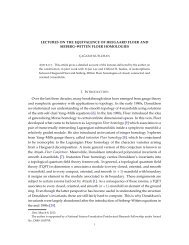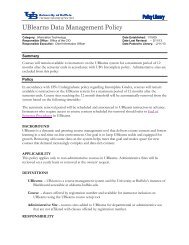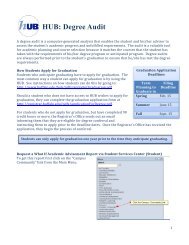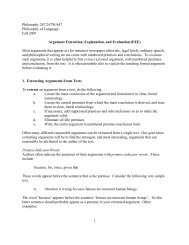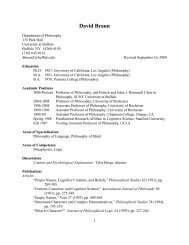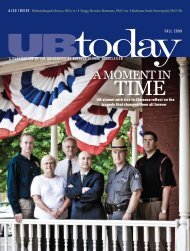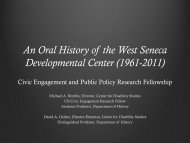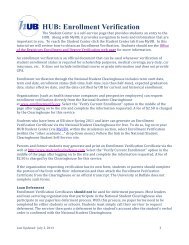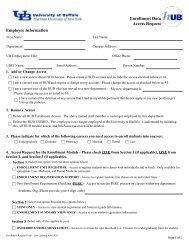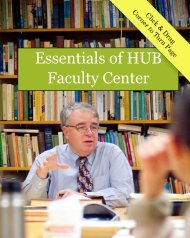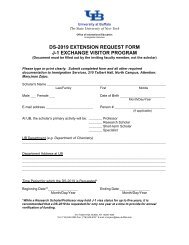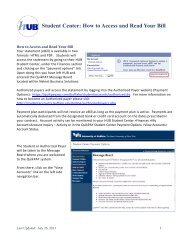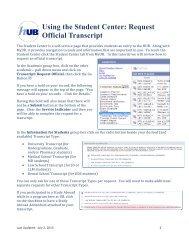A WALK IN THE WOODS - University at Buffalo
A WALK IN THE WOODS - University at Buffalo
A WALK IN THE WOODS - University at Buffalo
Create successful ePaper yourself
Turn your PDF publications into a flip-book with our unique Google optimized e-Paper software.
alumniprofileChristopher Thornberg, BA ’89 : Economic forecaster offers a no-nonsenseapproach and a track record for calling it correctlyDUR<strong>IN</strong>G <strong>THE</strong> MID-2000S, as home prices werejumping in much of the country and unemploymentnumbers were an afterthought, ChristopherThornberg, BA ’89, realized something wasn’t right.Home values and new-home construction trendsdidn’t m<strong>at</strong>ch fundamental historic income levelsand popul<strong>at</strong>ion growth figures, the economistnoticed.Not many agreed with him. Today, many do.Thornberg is widely cited as one of the earliest andmost accur<strong>at</strong>e predictors of the sub-prime mortgagemarket crash th<strong>at</strong> began in 2007 and the globalrecession th<strong>at</strong> followed.“There is an old saying in finance th<strong>at</strong> the trendis your friend. Unfortun<strong>at</strong>ely, this is very dangerousadvice in practice. We focus on the fundamentals—andwhenthe trends don’tRIGHT ON<strong>THE</strong> MONEYm<strong>at</strong>ch the fundamentals,you canbet th<strong>at</strong> somethingis reallywrong,” he says.Thornberg’s success today is due in part to the<strong>at</strong>tention he has received since calling the economicdownturn. In 2007, he co-founded BeaconEconomics, a Los Angeles-based economicsresearch, consulting and forecasting firm. Its staffhas since grown from two to 15.Between 2008 and 2012, he was a chief economicadviser to the California St<strong>at</strong>e Controller’sOffice and chaired the st<strong>at</strong>e controller’s Councilof Economic Advisors—the body th<strong>at</strong> advises thest<strong>at</strong>e’s chief fiscal officer about emerging economicissues.He gives more than 80 speeches a year toeveryone from local and st<strong>at</strong>e officials to hedgefund managers to university leaders, mainly inCalifornia, but increasingly in other parts of then<strong>at</strong>ion and the world. And he has become a regularmedia comment<strong>at</strong>or, appearing everywhere fromNBC’s “Today” show to ABC’s “Nightline” to TheNew York Times and The Wall Street Journal. Arecent Los Angeles Times profile of him was headlined“Housing bubble hero.”Thornberg, who grew up in Rochester, N.Y.,studied business <strong>at</strong> UB with a focus on marketing.After gradu<strong>at</strong>ing, he spent two years traveling theworld before enrolling <strong>at</strong> UCLA for gradu<strong>at</strong>e school.He earned his PhD in 1997 and then accepted a jobas an economics professor <strong>at</strong> Clemson <strong>University</strong> inSouth Carolina.In 2000, he faced a decision: Stay <strong>at</strong> Clemsonand climb the academic ladder or take a job offeredby his former adviser <strong>at</strong> UCLA <strong>at</strong> the university’seconomic forecasting center. He opted for UCLA.Thirteen years l<strong>at</strong>er, he is convinced he madethe right move.Thornberg believes the bridge economic forecastingprovides between academic work and thebusiness community better suits his personalitythan does the slower-paced, more isol<strong>at</strong>ed world ofuniversities.His firm’s blog is called “No NonsenseEconomics: Economic Insights Without The Hype,”a motto partly influenced by Thornberg’s don’thold-backpersonality (he doesn’t worry aboutdropping a salty word into an interview), and partlyby the firm’s commitment to its business model ofdelivering objective, accur<strong>at</strong>e research as opposedto “selling” answers clients may want to hear.For Thornberg, there are two keys to economicforecasting: trends and fundamentals. Trendsmean the l<strong>at</strong>est unemployment r<strong>at</strong>es, home pricenumbers, etc. Fundamentals mean th<strong>at</strong> you have tounderstand past economic swings and rel<strong>at</strong>e to currentones.Despite his accur<strong>at</strong>e prediction about the recenteconomic downturn, Thornberg concedes forecastingis an inexact science.“No forecast is right,” he says. “Some forecastsare less wrong than other forecasts. I just think I’mpretty good <strong>at</strong> being less wrong than the others.”Story by Sean Nealon, BA ’01, with photo byMax S. GerberThornberg onwading througheconomic news> Pay <strong>at</strong>tention to the source. Too much of wh<strong>at</strong> we hear is junk—people shouting opinions not facts.Look for content based on actual d<strong>at</strong>a and unbiased analysis.> One month is not a trend. You need to look <strong>at</strong> multiple periods to perceive a change in trend.> A lot of conventional wisdom is wrong. For example, the ideas th<strong>at</strong> raising taxes hurts economicgrowth and th<strong>at</strong> interest tax deductions increase homeownership, while popular with the politicians,have little support in the d<strong>at</strong>a.www.alumni.buffalo.edu UBTODAY Fall 2013 29



